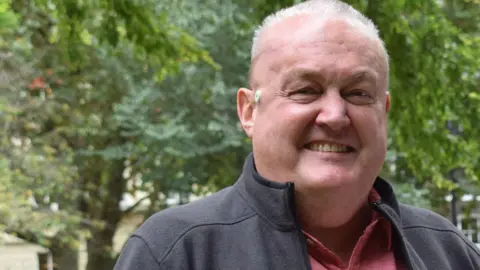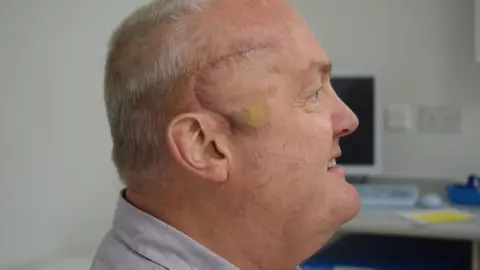Man’s brain tumor halved in therapy trial
 University College London Hospitals NHS Foundation Trust
University College London Hospitals NHS Foundation TrustA man’s brain tumor has halved in just a few weeks thanks to a new radioactive therapy.
Paul Reed, 62, from Luton, was the first patient to take part in the trial aimed at treating glioblastoma, a type of cancer which kills most patients within 18 months.
The therapy, from University College London Hospitals NHS Foundation Trust (UCLH), involved injecting low levels of radioactivity directly into the tumor to kill the cancer cells.
The doctor who designed the trial said the results were “remarkable for someone whose tumor is so aggressive”.
Surgeons removed as much of the tumor as possible before implanting a small medical device, called an Omaya reservoir, beneath the skull.
The drug ATT001, given weekly for four to six weeks, is effective at short distances, causing lethal damage to cancer cells while causing no harm to healthy tissue.
 University College London Hospitals NHS Foundation Trust
University College London Hospitals NHS Foundation TrustMr Reed first noticed severe headaches last December and, two weeks later, his face drooped to one side.
He underwent surgery to remove as much of the tumor as possible soon after diagnosis, followed by radiotherapy and chemotherapy.
In July, doctors found the tumor was growing again and he was offered a place in the new CITADEL-123 trial at UCLH.
He said, “I was fully expecting the tumor to come back due to its aggressive nature. I knew the outcome would not be good and I was happy to explore something else.”
“I’m not afraid of any of this. We’ve all been dealt a card and you don’t know which card you’re going to get.
“It would be wonderful if this treatment helps me and if it doesn’t, it doesn’t…it may benefit someone else down the road.”
‘Really quite remarkable’
The trial was designed by Dr Paul Mulholland, UCLH consultant medical oncologist and principal investigator.
He said: “Because it targets tumor cells directly, it is very powerful at killing them.
“We’ve just seen the results of his (Paul’s) scans and the last scan of his treatment showed a reduction in the tumor, which is really quite remarkable for someone whose tumor is so aggressive.”
Since this was the first human study, Dr. Mulholland said, they were cautious in their approach, but expected to increase the radiation dose and number of patients later.



